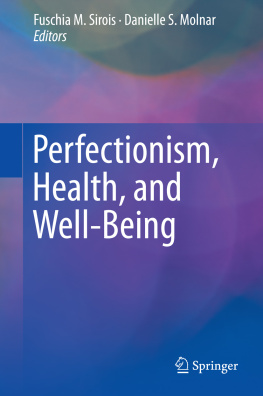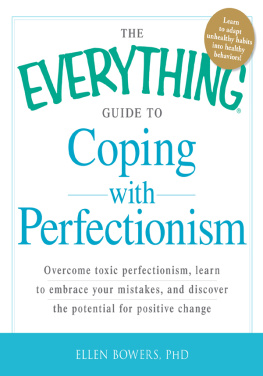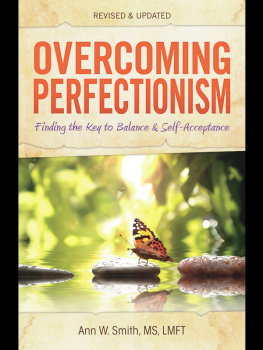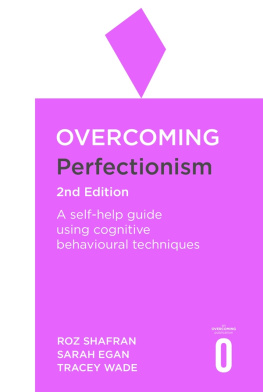1. Conceptualizations of Perfectionism, Health, and Well-Being: An Introductory Overview
As of July 1, 2015, Fuschia Sirois is with the Department of Psychology, the University of Sheffield, Western Bank, Sheffield, UK.
Perfectionism research has burgeoned over the past two decades. During this time, there have been a number of empirical and theoretical advances providing insight into the nature of perfectionism and its associated risks. Broadly, perfectionism can be described as setting and striving for excessively high and often unrealistic standards, accompanied by frequent thoughts focused on attainment of these standards and overly critical self-evaluation (Frost, Marten, Lahart, & Rosenblate, ).
This surge of interest in personality as risk or resilience for health in recent years has lent momentum to a burgeoning literature focused on the role of perfectionism in health. Two important themes have tended to capture the lions share of researchers attention in this rapidly growing literature. The first concerns perfectionisms role in psychological distress with an extensive body of work clearly implicating perfectionism in a vast array of adjustment problems including anxiety, depression, and eating disorders in both clinical and nonclinical samples (see Bardone-Cone et al., ). From this perspective, perfectionism can confer risk for poor psychological well-being.
The other predominant theme in the perfectionism literature is whether perfectionism has adaptive or healthy components that may promote well-being. This theme has grown from the zeitgeist of positive psychology (Seligman & Csikszentmihalyi, ). However, as you will see throughout the chapters of this volume, it remains a topic ripe with controversy and complexity.
We suggest that there is a third theme that is of equal or even greater importance from a public health perspective, but it is a domain in the perfectionism field that has not thus far received the sustained attention it deservesthat is, the role of perfectionism in physical health. The notion that perfectionism might be linked to not only poor mental health, but also poor physical health outcomes is not new (see Wolff, ). From a biopsychosocial perspective, psychological states and social factors play an integral role in the development and exacerbation of physical health issues and are therefore essential factors to consider for understanding how perfectionism may confer risk or resilience for physical health outcomes. Accordingly, we propose that widening the scope of perfectionism and mental health research to include a more specific and routine emphasis on physical health is a natural next step in the evolution of this important research literature and one that can have significant implications for understanding a range of health-related outcomes.
After introducing and summarizing the different ways that the perfectionism construct has been conceptualized and measured, we then present a brief introduction to how the terms health and well-being have been defined in the literature, highlighting areas that may be particularly relevant for understanding the potential linkages to perfectionism dimensions. We then conclude with an overview of the structure and organization of this book, which provides the latest perspectives and research on perfectionism, health, and well-being organized into three sections: Perfectionism and Health; Perfectionism, Psychopathology, and Well-Being; and Perfectionism, Health, and Well-Being in Context.
Conceptualization and Measurement of Perfectionism
It is important to recognize up front that there are striking differences among researchers with respect to how they define, conceptualize, and assess perfectionism. These discrepancies are important to acknowledge because the way in which perfectionism is conceptualized and measured has a considerable impact on the results that emerge from empirical research. Typically, research conducted on perfectionism and health does not incorporate multiple measures of perfectionism representing different theoretical camps, and it should not be presumed that measures that seem substantially related to each other are indeed equivalent, especially in terms of their implications for health outcomes. Fry and Debats (), for example, examined the link between perfectionism and mortality risk in a sample of older adults with diabetes. Contrary to their hypotheses, they found that trait perfectionism was associated with greater longevity. However, when they focused on the role of perfectionistic dysfunctional attitudes in mortality risk in the same sample, they found that perfectionism was associated with greater mortality risk. These conflicting findings that have divergent and potentially critical implications attest to the importance of considering measurement issues when assessing links between perfectionism and health. Consequently, the first section of the book will introduce the reader to the different ways that the perfectionism construct has been conceptualized and measured.
A Unitary or a Multifarious Construct?
A careful reading of the literature on perfectionism reveals that most of the discussion concerning the conceptualization and measurement of perfectionism can be boiled down to three central issues. The first issue concerns whether perfectionism should be considered as a unidimensional or as a multidimensional construct. Originally, there was a general consensus regarding the essence of perfectionism, as early theorists from different theoretical orientations, such as Sigmund Freud () seminal writings speak directly to this point as she stated,
He holds before his soul his image of perfection and unconsciously tells himself: Forget about the disgraceful creature you actually are; this is how you should be; and to be this idealized self is all that matters. You should be able to endure everything, to understand everything, to like everybody, to always be productive. (p. 65)
These classic theorists further observed that perfectionists scrutinize themselves and others harshly and approach life with a cognitive style characterized by rigidity and all or none thinking. This was best illustrated by Ellis () wrote, The need to be perfect places a person in a self-destructive double bind. If one fails to meet the unrealistic expectation, one has failed; but if one does meet it, one feels no glow of achievement for one has only done what was expected (p. 237).
Hamachek () was the first to diverge from this unidimensional conceptualization of perfectionism and to suggest that perfectionism is multidimensional and that the different dimensions have distinct functional effects, allowing for both positive and negative outcomes. Specifically, he postulated that there are two distinct types of perfectionism: normal and neurotic. He delineated normal perfectionists as those who derive a very real sense of pleasure from the labors of a painstaking effort and who feel free to be less precise as the situation permits (p. 27). Conversely, he described neurotic perfectionists as the sort of people whose effortseven their best onesnever seem quite good enough, at least in their own eyes. It always seems to these persons that they couldand shoulddo better they are unable to feel satisfaction because in their own eyes they never seem to do things good enough to warrant the feeling (p. 27).












